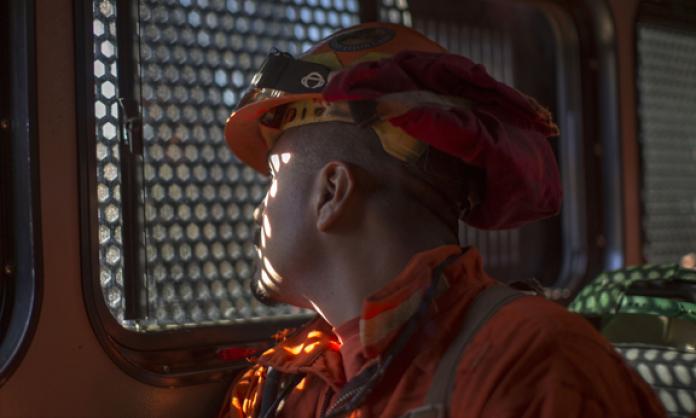Prisoners in many states in the US began a national strike on 21 August, the anniversary of the murder of Black Panther member George Jackson by guards in 1971 at San Quentin prison, California.
The strike will end on 9 September, the anniversary of the great prison uprising at Attica, New York, also in 1971. The rebellion was crushed in blood, in a massive attack ordered by governor Nelson Rockefeller, billionaire scion of the oil industry family.
The central demand of the current actions – which range from work stoppages, hunger strikes and sit-downs to boycotts of prison stores – is an end to prison slave labour.
Most people do not know that the US Constitution allows for slavery. The Thirteenth Amendment, ratified in 1865 after the Civil War, abolished slavery “except as a punishment for crime whereof the party shall have been duly convicted”.
Almost immediately, states, especially in the former Confederacy, passed vagrancy laws to round up ex-slaves and sell their labour. The Jim Crow system of white rule in the South created a huge economic sector based on unfree Black labour, as in the prison chain gangs at institutions such as the notorious Parchman Farm in Mississippi, and in contract labour, private firms working Black prisoners into the grave.
The Black movement in the 1960s and 1970s overthrew the Jim Crow system, but prison slave labour has continued throughout the country. Much work by prisoners isn’t paid. Sometimes the slavery is barely covered up by pitiful “wages”. Here are what some prisoners report, as related in interviews with progressive news site Democracy Now!:
Anthony Forest: “Because I know how to strip floors, wax them, take the gum up off floor, I started doing that. At 16 cents an hour”.
Darryl Aikens: “I started out as a line server, serving food for breakfast and dinner. Then I became a dishwasher and maintenance in the kitchen. It paid 13 cents an hour. I worked and made $20 a month, and they [prison authorities] took 55 percent of that for restitution [for food etc.]”.
Cole Dorsey: “It’s kind of like a modern-day plantation situation, specifically targeting poor people, and most especially the most marginalised communities, Black and Brown”.
The action by prisoners is a movement of part of the working class, whose employment as slaves lowers the wages and conditions of the whole working class.
While white prisoners are employed as slaves in work inside the prisons and in contract work for outside firms, 60 percent of prisoners are African American or Latino. Given the history of unfree Black labour from chattel slavery up to the present, it isn’t surprising that reports reaching support organisations on the outside say that Blacks have taken the lead in these multiracial actions.
There are nine other demands prisoners are raising. One of these is the right to vote. Only two states, Vermont and Maine, allow this. In the remaining 48 they cannot – disenfranchising 2.8 million prisoners. Four states – Iowa, Florida, Kentucky and Virginia – permanently deny felons the vote after being released from prison. Six others do the same for some felons. Others deny parolees the franchise.
It is difficult to obtain full information about the strike, as the authorities have denied that anything is happening in their prisons, or punish leaders in ways that make it hard to communicate with the outside.
Amani Sawari, an African American woman, is a spokesperson for Jailhouse Lawyers Speak, a network of prisoners helping to organise the strike. She is now on the outside and reports on the retaliation against strike leaders.
“Comrade Malik hasn’t been allowed to take showers. They are hunger-striking there”, she told Democracy Now!. “Jason Walker hasn’t been allowed to have toilet paper, towels or have access to taking a shower or having clean clothes, in retaliation to his organising of the strike in Texas.”
She explained that Comrade Malik was put in solitary confinement, an internationally recognised form of torture, in a pre-emptive move on 15 August. “He’s in a concrete cell that’s over 100 degrees Fahrenheit … He’s only escorted out in handcuffs. He’s not allowed to have easy communications with the outside.”
Jason Walker wrote an article about the conditions in Texas prisons. “After that … he was moved to solitary confinement. But even in groups, like in South Carolina, prisoners in McCormick [prison] have been having daily strip searches done on them since 20 August, the day before the strike began.
“Also, David Easley and James Ward, they are in Ohio, Toledo’s correctional facility, and they have no contact with the outside. And they’re also in solitary confinement.
“So we can see that retaliation is happening against individual organisers in the beginning. And now we’re seeing when inmates are standing up and choosing to strike, they are moved to solitary to try to keep prisoners from joining. But this is spreading the fire. Prisoners know that this is a climate where they can actually stand up and feel supported. There have been solidarity marches and rallies in at least 21 cities across the country.”
These brave men and women taking action in the face of retaliation deserve our support. We must educate the labour movement and all workers that prisoners are part of the working class, and it is in the interests of all workers to come to their defence.










